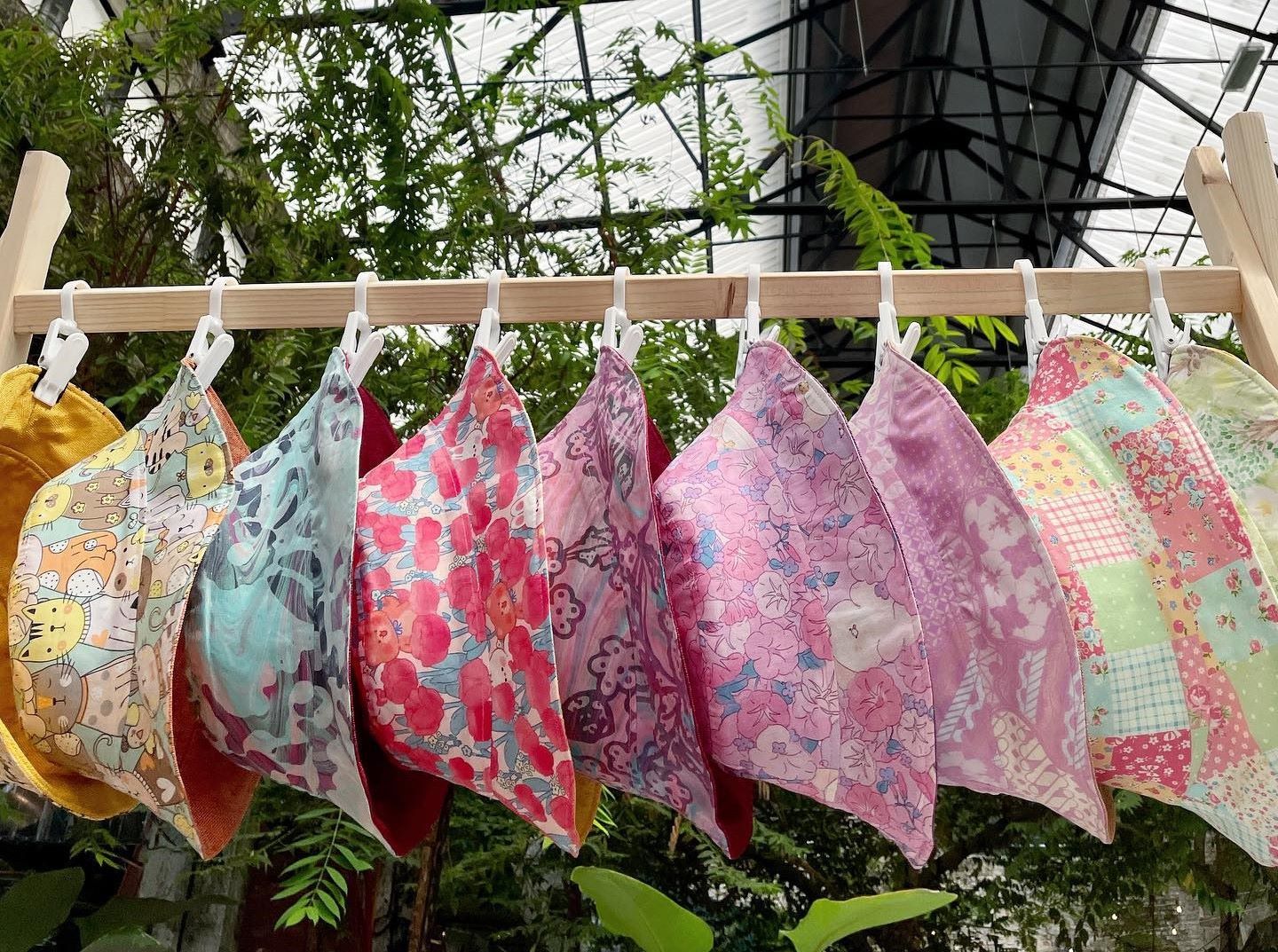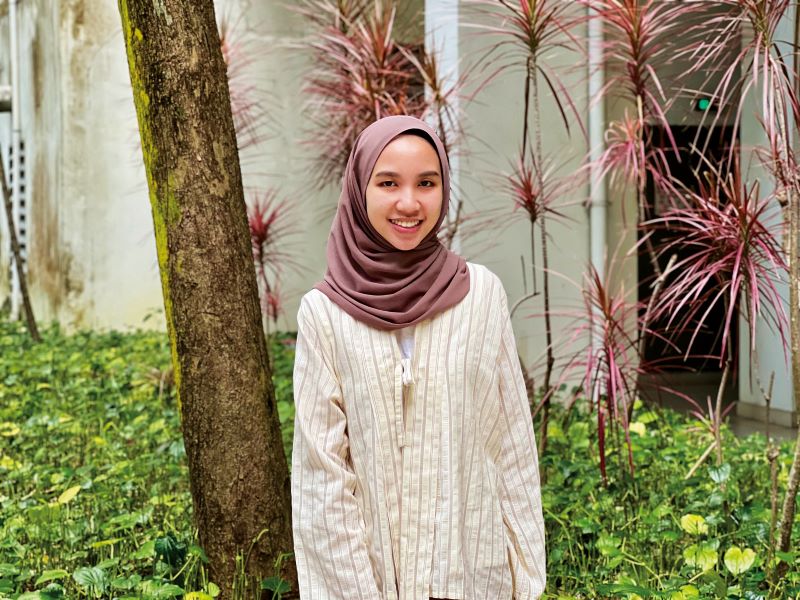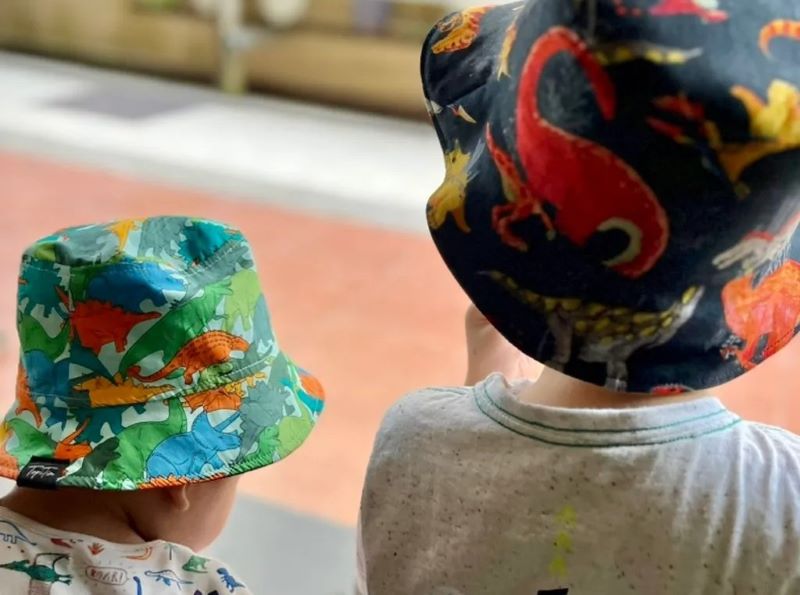
Founder Fatin Liyana uses a wide range of materials, such as cotton, linen, denim and corduroy, to make her hats (All photos: TopiTin)
Some of us hold on to childhood items because they are receptacles of sentimental value that we cannot let go of. These objects evoke fond memories of, for example, someone or some place that used to be part of our lives. For Fatin Liyana, 25, making a bucket hat using her late grandfather’s kain pelikat meant she could have something that would always remind her of him.
Fatin’s story began during Malaysia’s first lockdown in March 2020. Numerous sectors of the economy, including the education industry, operated in uncertainty, owing to unforeseen circumstances. Students had time to spare, as schools and universities were still experimenting with online classes.
Spending hours on YouTube watching tutorials for DIY projects prompted Fatin to make a handcrafted item for herself. “I came across videos of people making purses, bags and bucket hats using thrifted clothes. I decided to try making a bucket hat using my late grandfather’s kain pelikat,” she says.
She chose to make a hat because her father has always loved the accessory and has a whole collection of them in their house. “I believe that’s why the tutorial caught my attention the most.”
Fatin uploaded a photo of the finished creation on Instagram to show what she was up to. “To my surprise, a lot of my friends and family asked me to make more because they wanted to buy it too.”
Her customer base grew rapidly and it became a challenge to manage her personal account. Thus, she decided it was time to create a business profile for TopiTin — a portmanteau of topi (Malay for “hat”) and her name — as well as launch a website for the brand.
img_3967.jpg

It is safe to say that TopiTin is a family business. It began with the intention of remembering a loved one who had passed on, and continued to flourish with support from her parents and siblings. Her brother, an expert in building websites, helped set one up for her.
As her mother often offers tailoring services to relatives, Fatin did not have to look far to learn how to sew and was able to use the machines and equipment mum has at home. After picking up basic sewing skills, she quickly mastered more complex techniques that proved useful for her projects.
A graphic design graduate, Fatin also came up with her own design template for the hat. “It took me more than a year to get the perfect sketch. Of course, I could just follow what other makers have done, but I wanted to make my own that would be suitable for Asians.”
TopiTin offers free-size hats as displayed on its website, but the label also accepts custom orders from customers who require personalised measurements.
Fatin works with her mother to produce the bucket hats. They rely on a cutting machine to ensure the process moves faster, as they can cut multiple layers of fabric at one go. “Using a pair of scissors would take forever, so the tool is really helpful. After that, it is about putting the different parts together. It used to take me half an hour to make one hat; now, I can do it in 15 minutes.” Having the necessary devices help in the production of up to 30 pieces for one pattern.
hats_for_kits.jpg

Besides visiting TopiTin’s website and Shopee page, customers can also touch, feel and try TopiTin’s creations at various locations around the Klang Valley, as it is a frequent participant of pop-up markets. Joining such events means Fatin has to ensure a continuous supply of products for both online and offline sales.
While Fatin uses a wide range of materials, such as cotton, linen, denim and corduroy, to make her hats, most of them are crafted from cotton and linen because these fabrics offer more interesting illustrations and have a sturdy structure.
The label benefited from the fact that online shopping became a huge phenomenon at the height of the pandemic. It received a good response from the get-go and even attracted clients overseas.
“My first foreign customer was from the Seychelles. She found my brand and told her friends and family about it. The shipping fee was certainly expensive — it can be pricier than the product itself — and we always advise them about that. If they are willing to pay, we are happy to make the necessary arrangements.” Besides the island nation off the coast of East Africa, her products have also been dispatched to the UK and Australia.
When Fatin set up TopiTin, she did not really have a target audience. Eighty per cent of her customers are women and most of them hijabis. (Bucket hats serve as an easier way to cover one’s hair). “Our designs are vibrant and colourful, so they may be more appealing to women. But, generally, our products are unisex.
“We want people to wear our bucket hats to express themselves and their personal style in fashion. We have a variety of designs and materials and believe there is something for everyone.”
This article first appeared on June 26, 2023 in The Edge Malaysia.


